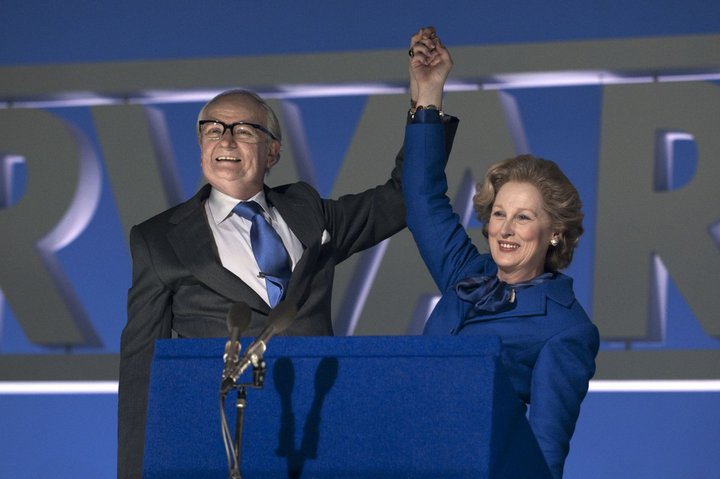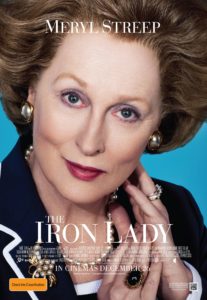Director: Phyllida Lloyd
Runtime: 105 minutes
Starring: Meryl Streep, Jim Broadbent, Anthony Head, Richard E. Grant
Distributor: Icon
Country: UK
Rating: Wait for DVD/Blu-ray (?)
Her reputation for standing up to the Soviets may have earned her the nickname the “Iron Lady”, a period that is barely examined in Phyllida Lloyd’s biopic of former British PM Margaret Thatcher, but her stance against the trade unions, public push against Asian immigration and general conservatism earned her far less flattering names in the court of public opinion.
As an aged Margaret Thatcher (Meryl Streep) discusses the price of milk with her husband Denis (Jim Broadbent), who happens to have been dead for 8 years, she looks back at her life and accomplishments. From her earliest entry into politics as a local member, through to her years as the leader of the opposition and the Prime Minister of Great Britain, Thatcher’s career is given to us in snatches, with the highlight reel including the Falklands War, IRA bombings and the riots in the streets in 1983 and at regular intervals afterwards.
The Iron Lady is a performance piece, and primarily a showcase for Meryl Streep’s incredible talents. Streep’s portrayal of one of the most famous leaders of the twentieth century is pitch-perfect, especially the aged Thatcher who teeters between a state of senility and firebrand of old. There are times when you can see the cogs of acting, however, with every single line feeling like a speech in the making. It is as though a personal soapbox is hovering just outside of the frame, waiting for her to step up on the most mundane of issues. The older Thatcher is aided greatly by some award-worthy makeup, but it is undeniably Streep who brings the frail former Prime Minister to life. There is real pathos and tragedy in Thatcher’s knee-jerk reaction to move swiftly on the actions of terrorists, even years after she no longer has the power to do so.
There is perhaps a recognition by director Lloyd that this is the strongest of the performances and that it lends itself to a sympathetic view of the Iron Lady, or perhaps it was simply the expense of the prosthetics, but far too much time is spent with Thatcher the Elder. With the exception of the period immediately surrounding the Falklands War, Thatcher’s strict approach to governing over the course of 11 years as Prime Minister (and a prior four as Education Secretary) are glossed over with the casualness of a musical montage. During this period, the United Kingdom was almost brought to its knees through a series of riots, bombings and social unrest that made the 2011 London Riots look like a schoolyard scuffle. Thatcher’s take-no-prisoners attitude is summed up in a single line: “The medicine is harsh, but the patient requires it”. When the bombs quite literally go off, aside from a few references to the IRA, there is no context for it.
We are perpetually reminded that this is due to her working-class roots, but beyond this little else is learned about the person under the tough exterior. “It’s not like you, looking back,” remarks Broadbent’s Denis Thatcher, and perhaps there is some cautionary wisdom in that. These crucial formative years, when a young Margaret Roberts (Alexandra Roach) first enters politics are meant to evoke a sense of the post-Second World War can-do attitude, and this is briefly explored through Maggie’s relationship with her father. However, the comparatively inexperienced Roach’s wide-eyed performance only scrapes the surface and her scenes waste the precious time we have to learn about Thatcher before she became the Iron Lady. Indeed, the film assumes a great deal of audience knowledge about Thatcher’s Britain as well, which makes this an uneven experience from start to finish.
Part of the flaw in The Iron Lady surely lies in Shame scribe Abi Morgan’s screenplay, but director Lloyd’s uneven direction holds more of the balance of blame. With only one other theatrical feature under her belt, the ill-received but popular Mamma Mia!, Lloyd doesn’t have the confidence to deal with material on this scale. Cobbling together decent documentary footage (especially from the 1983 riots), an uneven makeover montage in the style of The King’s Speech and some key soundbites, The Iron Lady betrays Lloyd’s musical origins but without any accompanying show-stoppers.

The Iron Lady is released in Australian on 26 December 2011 from Icon.





